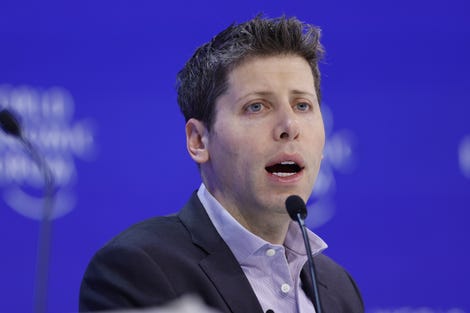Welcome to AI This Week, Gizmodo’s weekly deep dive on what’s been happening in artificial intelligence.
For months, I’ve been harping on a particular point, which is that artificial intelligence tools—as they’re currently being deployed—are mostly good at one thing: Replacing human employees. The “AI revolution” has mostly been a corporate one, an insurrection against the rank-and-file that leverages new technologies to reduce a company’s overall headcount. The biggest sellers of AI have been very open about this—admitting time and again that new forms of automation will allow human jobs to be repurposed as software.
We got another dose of that this week, when the founder of Google’s DeepMind, Mustafa Suleyman, sat down for an interview with CNBC. Suleyman was in Davos, Switzerland, for the World Economic Forum’s annual get-together, where AI was reportedly the most popular topic of conversation. During his interview, Suleyman was asked by news anchor Rebecca Quirk whether AI was “going to replace humans in the workplace in massive amounts.”
The tech CEO’s answer was this: “I think in the long term—over many decades—we have to think very hard about how we integrate these tools because, left completely to the market…these are fundamentally labour replacing tools.”
And there it is. Suleyman makes this sound like some foggy future hypothetical but it’s obvious that said “labour replacement” is already happening. The tech and media industries—which are uniquely exposed to the threat of AI-related job losses—saw huge layoffs last year, right as AI was “coming online.” In only the first few weeks of January, well-established companies like Google, Amazon, YouTube, Salesforce, and others have announced more aggressive layoffs that have been explicitly linked to greater AI deployment.
The general consensus in corporate America seems to be that companies should use AI to operate leaner teams, the likes of which can be bolstered by small groups of AI-savvy professionals. These AI professionals will become an increasingly sought after class of worker, as they’ll offer the opportunity to reorganize corporate structures around automation, thus making them more “efficient.”
For companies, the benefits of this are obvious. You don’t have to pay a software program, nor do you have to supply it with health benefits. It won’t get pregnant and have to take six months off to care for its newborn child, nor will it ever become disgruntled with its working conditions and try to start a union drive in the break room.
The billionaires who are marketing this technology have made vague rhetorical gestures to things like universal basic income as a cure for the inevitable worker displacements that are going to happen, but only a fool would think those are anything other than empty promises designed to stave off some sort of underclass uprising. The truth is that AI is a technology that was made by and for the managers of the world. The frenzy in Davos this week—where the world’s wealthiest fawned over it like Greek peasants discovering Promethean fire—is only the latest reminder of that.

Question of the day: What’s OpenAI’s excuse for becoming a defense contractor?
The short answer to that question is: Not a very good one. This week, it was revealed that the influential AI organization was working with the Pentagon to develop new cybersecurity tools. OpenAI had previously promised not to join the defence industry. Now, after a quick edit to its terms of service, the billion dollar company is charging full-steam ahead with the development of new toys for the world’s most powerful military. After getting confronted about this pretty drastic pivot, the company’s response was basically: ¯_(ツ)_/¯ …“Because we previously had what was essentially a blanket prohibition on military, many people thought that would prohibit many of these use cases, which people think are very much aligned with what we want to see in the world,” a company spokesperson told Bloomberg. I’m not sure what the hell that means but it doesn’t sound particularly convincing. Of course, OpenAI is not alone. Many companies are currently rushing to market their AI services to the defense community. It only makes sense that a technology that has been referred to as the “most revolutionary technology” seen in decades would inevitably get sucked up into America’s military-industrial complex. Given what other countries are already doing with AI, I’d imagine this is only the beginning.
